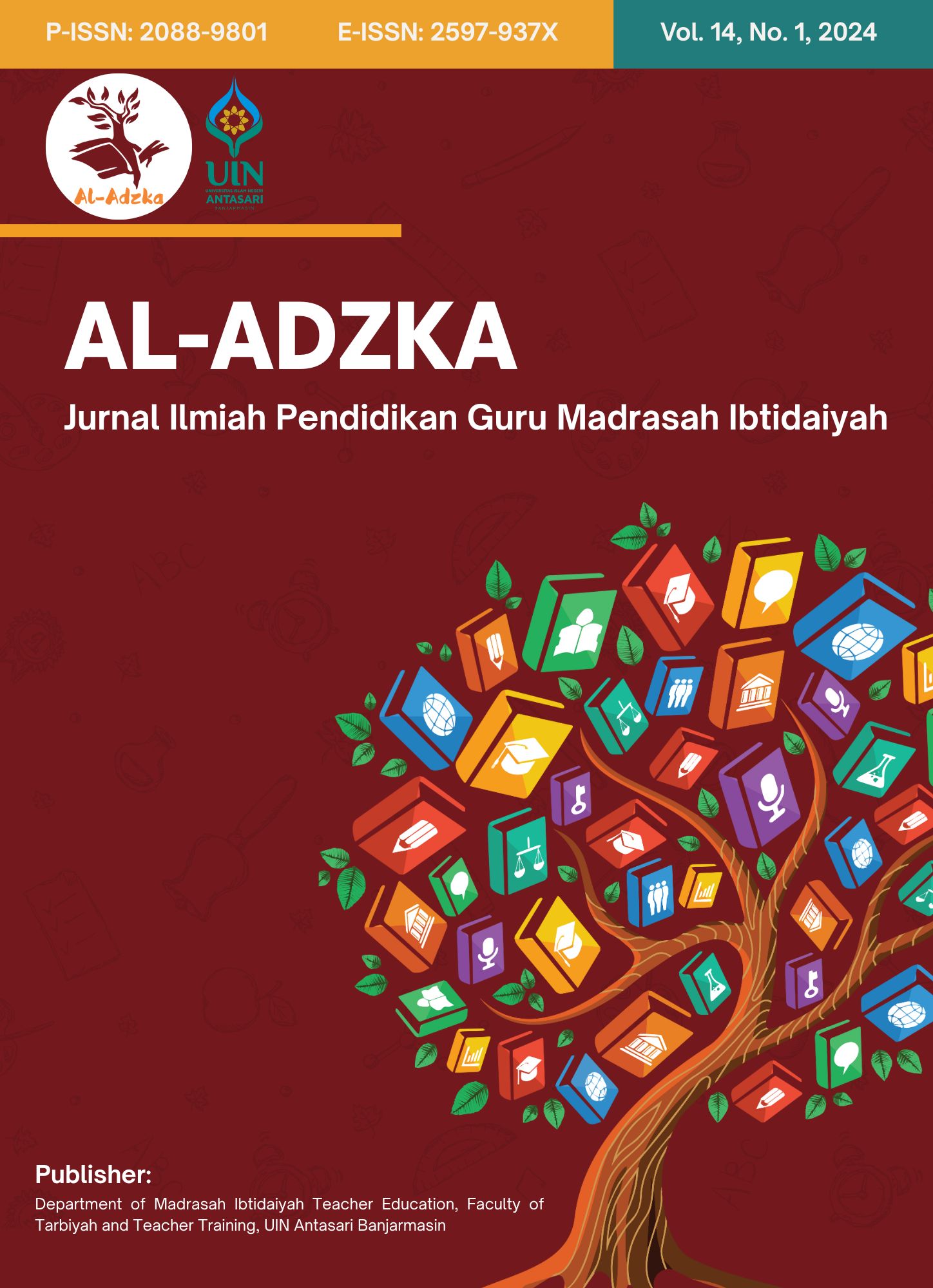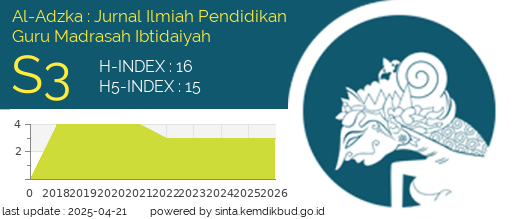Development of Jumanji Board Game Media on Ecosystem Material in Islamic Elementary School
DOI:
https://doi.org/10.18592/aladzkapgmi.v14i1.12783Keywords:
Islamic Elementary School;Jumanji Board;Teaching MediaAbstract
The article aims to develop a Jumanji board game media in class V Madrasah Ibtidaiyah At-Taqwa Bondowoso. Learning media has a somewhat important role in learning because it can make it easier for teachers to convey learning objectives to their students. From this, of course, it is necessary to develop learning media tailored to the needs of schools and the characteristics of students. The research results found that the enthusiasm and motivation to learn were still lacking, and the understanding of the material needed improvement. With the Jumanji board game, the media can overcome the obstacles that have been mentioned. Researchers use the R&D method using the ADDIE model, namely analysis, design, development, implementation, and evaluation. The result of this study is that researchers developed a learning media called the Jumanji Board. This media is a learning medium that can invite students to play while learning. The Jumanji board game media has colourful cards, game lines, pawns, dice, and sand time. This, of course, can attract students' motivation because, based on the study results, it was found that the enthusiasm and motivation to learn were still lacking, and the understanding of the material still needed to be improved. With the Jumanji board game, the media can overcome the obstacles that have been mentioned. The acquisition of media validation from expert validators obtained an average value of 90%. The results of this validation indicate that the Jumanji board game media has met the valid category or is very suitable for use.References
Achadah, A. (2019). Evaluasi Dalam Pendidikan Sebagai Alat Ukur Hasil Belajar. An-Nuha : Jurnal Kajian Islam, Pendidikan, Budaya Dan Sosial, 6(1), 97–114. https://doi.org/10.36835/annuha.v6i1.296
Allsburg, C. V. (1981). Jumanji. Houghton Mifflin Harcourt.
Ally, M. (2019). Competency Profile of the Digital and Online Teacher in Future Education. The International Review of Research in Open and Distributed Learning, 20(2). https://doi.org/10.19173/irrodl.v20i2.4206
Arifin, Moch. B. U. B., Sholeh, M., Hafiz, A., Agustin, R. D., & Wardana, M. D. K. (2021). Developing Interactive Mobile Mathematics Inquiry to Enhance Students’ Problem-solving Skill. International Journal of Interactive Mobile Technologies (iJIM), 15(01), 24. https://doi.org/10.3991/ijim.v15i01.20067
Bahri, Moh. (2020). MI At-Taqwa Bondowoso Jadi Madrasah Paling Religi di Jawa Timur, timesindonesia, 3 Januari 2020, https://timesindonesia.co.id/pendidikan/245433/mi-attaqwa-bondowoso-jadi-madrasah-paling-religi-di-jawa-timur
Chen, Y. (2019). A Review of the Development and Research of Production Orientation Methods. Proceedings of the 2nd International Workshop on Education Reform and Social Sciences (ERSS 2019). Proceedings of the 2nd International Workshop on Education Reform and Social Sciences (ERSS 2019), Chengdu City, China. https://doi.org/10.2991/assehr.k.191206.048
Gule, Y. (2022). Hasil Belajar Siswa (Studi Kasus Tinjauan Melalui Kompetensi Sosial dan Keteladanan Guru. Adanu Abimata.
Hermawan, M. R. (2022). Teaching Method As Capital In Information Exchange Activities. Devotion : Journal of Research and Community Service, 3(8), 783–789. https://doi.org/10.36418/dev.v3i08.181
Mansur, M., & Sholeh, M. (2024). Implementing Character Education Based on Local Wisdom in a Public Islamic Elementary School. Journal of Integrated Elementary Education, 4(1), 54–70. https://doi.org/10.21580/jieed.v4i1.20238
Musfiqon, H. M., & Nurdyansah. (2015). Pendekatan Pembelajaran Saintifik. Nizamia Learning Center.
Oktasavira, E. D., & Subagio, Fx. M. (2020). Pengembangan Media Jumanji Dalam Pembelajaran Tematik Peserta Didik Kelas IV Sekolah Dasar. JPGSD, 8(5).
Pito, A. H. (2018). Media Pembelajaran dalam Perspektif Al-Qur’an. Andragogi: Jurnal Diklat Teknis Pendidikan Dan Keagamaan, 6(2), 97–117. https://doi.org/10.36052/andragogi.v6i2.59
Prasetyo, A., & Wijaya, A. (2019). Pengembangan Media Pembelajaran Berbasis Papan Permainan “Jumanji Physics” Pada Pokok Bahasan Momentum Impuls Untuk Meningkatkan Hasil Belajar Peserta Didik Kelas X Sma 17agustus1945 Surabaya. Prosiding Seminar Nasional Fisika (E-Journal), SNF2019-PE-193–200. https://doi.org/10.21009/03.SNF2019.01.PE.24
Rahmawati, L., & Sholeh, M. (2021). Classroom Management In Creating Effective Learning In MIS Al-Ashriyah Banjarmasin. Al-Adzka: Jurnal Ilmiah Pendidikan Guru Madrasah Ibtidaiyah, 11(2). 76-85. https://doi.org/10.18592/aladzkapgmi.v11i2.4644
Riduwan. (2012). Dasar-Dasar Statistika. Bandung: Alfabeta.
Sanjaya, W. (2014). Media Komunikasi Pembelajaran. Kencana Prenada Media Grup.
Schneider, C., & Bodensohn, R. (2017). Student teachers’ appraisal of the importance of assessment in teacher education and self-reports on the development of assessment competence. Assessment in Education: Principles, Policy & Practice, 24(2), 127–146. https://doi.org/10.1080/0969594X.2017.1293002
Septialia, R. (2018). Pengembangan Media Permainan Jumanji untuk Pembelajaran Fisika SMP Kelas VII Materi Besaran dan Satuan [Skripsi]. Universitas Islam Negeri Raden Intan Lampung.
Sholeh, M., Jannah, R., Mahmudah, M., & Khairunnisa, K. (2021). Pengembangan Model Pembelajaran Efektif Dan Bermakna Di MI Perwanida Blitar. Muallimuna : Jurnal Madrasah Ibtidaiyah, 6(2), 16. https://doi.org/10.31602/muallimuna.v6i2.4301
Sugiyono. (2019). Metode Penelitian Kuantitatif, Kualitatif, dan R&D. Alfabeta.
Susanti, Susi. Putu Ida Arsani Dewi, Nanda Saputra, Atika Kumala Dewi, Fajar Wulandari, Retno Novitasari Kusumawardan, Ihwan Rahman Bahtiar, & Makherus Sholeh. (2022). Desain Media Pembelajaran SD/MI. Yayasan Penerbit Muhammad Zaini.
Undang-Undang No.20 Tahun 2003 Tentang Sistem Pendidikan Nasional.
Wahab, Abdul et.al. (2021). Media Pembelajaran Matematika. Aceh: Yayasan Penerbit Muhammad Zaini, 2021
Wardani, R. P., Zahroul F., C., Puspitaningrum, D. A., & Fitriyah N., Y. (2023). Correlation between teacher readiness and learning materials of 2013 curriculum in primary teacher. 020016. https://doi.org/10.1063/5.0111266
White, L. W., Jordan, K. E., & McDermott, H. (2023). Assessment of student readiness for clinical education in mixed-mode curriculum delivery: A case study. Quality Assurance in Education, 31(1), 151–166. https://doi.org/10.1108/QAE-02-2022-0044
Yuan, X., Zhao, Y., Xie, Y., Wu, L., & Wang, T. (2023). Trends in Research Related to Product Design for Rural Teaching from 2012 to 2022: A Bibliometric and Knowledge Mapping Analysis. In A. Marcus, E. Rosenzweig, & M. M. Soares (Eds.), Design, User Experience, and Usability (Vol. 14033, pp. 239–248). Springer Nature Switzerland. https://doi.org/10.1007/978-3-031-35708-4_18
Yuliatun, T., Uskenat, K., & Jua, S. K. (2023). Pengembangan Tes IPA Dua Tingkat Berbasis Permainan Jumanji Untuk Mengukur Pemahaman Konsep. Scholaria: Jurnal Pendidikan Dan Kebudayaan, 13(1), 39–47. https://doi.org/10.24246/j.js.2023.v13.i1.p39-47
Zahrah, F., & Arfa Ladamay, O. M. M. (2023). Kedudukan Pendidik Dalam Perspektif Islam Menurut Akrim Dalam Buku Ilmu Pendidikan Islam. Jurnal Pendidikan Islam Al-Ilmi, 6(2), 191. https://doi.org/10.32529/al-ilmi.v6i2.2620
Downloads
Published
How to Cite
Issue
Section
License
Copyright (c) 2024 Maghfirotul Firmaning Lestari, Muhammad Suwignyo Prayogo

This work is licensed under a Creative Commons Attribution 4.0 International License.
Authors who publish with this journal agree to the following terms:
- Authors retain copyright and grant the journal right of first publication with the work simultaneously licensed under a Creative Commons Attribution 4.0 International that allows others to share the work with an acknowledgement of the work's authorship and initial publication in this journal.
- Authors are able to enter into separate, additional contractual arrangements for the non-exclusive distribution of the journal's published version of the work (e.g., post it to an institutional repository or publish it in a book), with an acknowledgement of its initial publication in this journal.
- Authors are permitted and encouraged to post their work online (e.g., in institutional repositories or on their website) prior to and during the submission process, as it can lead to productive exchanges, as well as earlier and greater citation of published work.












